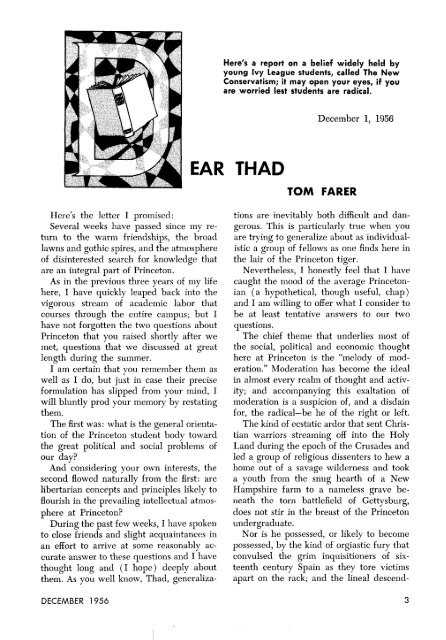Create successful ePaper yourself
Turn your PDF publications into a flip-book with our unique Google optimized e-Paper software.
Here's the letter I promised:<br />
Several weeks have passed since my return<br />
to the warm friendships, the broad<br />
lawns and gothic spires, and the atmosphere<br />
of disinterested search for knowledge that<br />
are an integral part of Princeton.<br />
As in the previous three years of my life<br />
here, I have quickly leaped back into the<br />
vigorous stream of academic labor that<br />
courses through the entire campus; but I<br />
have not forgotten the two questions about<br />
Princeton that you raised shortly after we<br />
met, questions that we discussed at great<br />
length during the summer.<br />
I am certain that you remember them as<br />
well as I do, but just in case their precise<br />
formulation has slipped from your mind, I<br />
will bluntly prod your memory by restating<br />
them.<br />
The first was: what is the general orientation<br />
of the Princeton student body toward<br />
the great political and social problenls of<br />
our day?<br />
And considering your own interests, the<br />
second flowed naturally from the first: are<br />
libertarian concepts and principles likely to<br />
flourish in the prevailing intellectual atmosphere<br />
at Princeton?<br />
During the past few weeks, I have spoken<br />
to close friends and slight acquaintances in<br />
an effort to arrive at some reasonably accurate<br />
answer to these questions and I have<br />
thought long and (I hope) deeply about<br />
them. As you well know, Thad, generaliza-<br />
DECEMBER 1956<br />
Here's a report on a belief widely held by<br />
young Ivy League students, called The New<br />
Conservatism; it may open your eyes, if you<br />
are worried lest students are radical.<br />
EAR THAD<br />
December 1, 1956<br />
TOM FARER<br />
tions are inevitably both difficult and dangerous.<br />
This is particularly true when you<br />
are trying to generalize about as individualistic<br />
a group of fellows as one finds here in<br />
the lair of the Princeton tiger.<br />
Nevertheless, I honestly feel that I have<br />
caught the mood of the average Princetonian<br />
(a hypothetical, though useful, chap)<br />
and I am willing to offer what I consider to<br />
be at least tentative answers to our two<br />
questions.<br />
The chief theme that underlies most of<br />
the social, political and economic thought<br />
here at Princeton is the "melody of moderation."<br />
Moderation has become the ideal<br />
in almost everyrealm of thought and activity;<br />
and accompanying this exaltation of<br />
moderation is a suspicion of, and a disdain<br />
for, the radical-be he of the right or left.<br />
The kind of ecstatic ardor that sent Christian<br />
warriors streaming off into the Holy<br />
Land during the epoch of the Crusades and<br />
led a group of religious dissenters to hew a<br />
home out of a savage wilderness and took<br />
a youth from the snug hearth of aNew<br />
Hampshire farm to a nameless grave beneath<br />
the torn battlefield of Gettysburg,<br />
does not stir in the breast of the Princeton<br />
undergraduate.<br />
Nor is he possessed, or likely to become<br />
possessed, by the kind of orgiastic fury that<br />
convulsed the grim inquisitioners of sixteenth<br />
century Spain as they tore victims<br />
apart on the rack; and the lineal descend-<br />
3
















